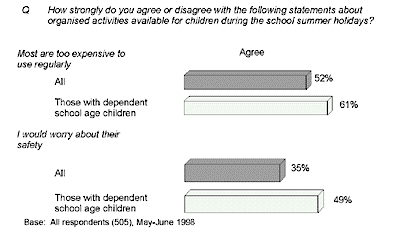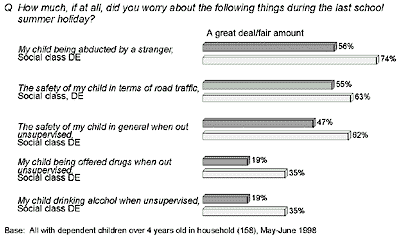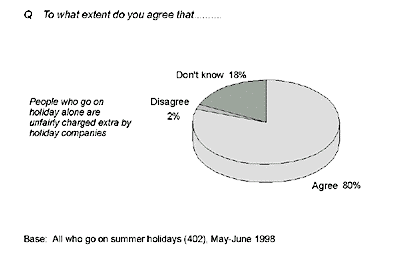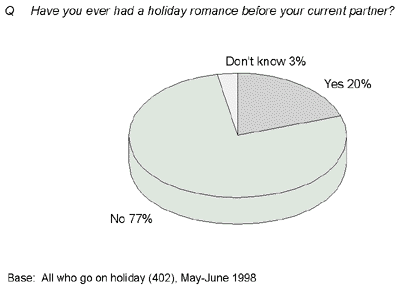The Summer Holiday: At Home; Going Away
The Nestlй Family Monitor is a series of research studies into family life in Britain undertaken on behalf of Nestlй by MORI. It is designed to examine attitudes to and perceptions of family life and how families in a Britain function approaching the millennium. Each wave of research addresses a core set of issues as well as a number of topical subjects. This summer, the monitor focused on the school summer holiday; at home and going away. Selected highlights from this summer holiday study are described below.
AT HOME
Memories of Childhood
The school summer holiday is looked back on fondly by respondents. Over four in five say they enjoyed the school summer holiday of their childhood (85%), and for almost half this is a strongly held view (48%).
Current Perceptions of School Summer Holiday
Parents have a less positive view of their children's school summer holiday. In contrast with their recollections of their own school summer holiday, half of all parents with school age children feel that the school summer holiday is too long (49%). Only a quarter disagree with this view (25%).
Holiday Entertainment
Almost two-thirds of parents state that they find it difficult to keep their children entertained during the school summer holiday (64%), and that such entertainment is expensive (68%).
Safety is also an issue for some. Half of all those with dependent children feel that they would worry about their child's safety at organised summer holiday events (49%).

Parental Concerns
When their children were out unsupervised during the last school summer holiday, almost half of all parents had worried about their safety in general (47%). This suggests that although they may not worry about what their children are doing, they are concerned about the possible threats to their child's safety. Parents of teenage children are more concerned about their safety than parents of children under 12 (71% and 45% respectively). Two in five (39%) of parents of younger children feel this is not yet an issue of concern, presumably because they constantly supervise their children.
When asked to think about their child(ren)'s safety during the last school summer holiday, over half the parents questioned state that they had been worried about the threat posed by road traffic (55%), and the possibility of their child being abducted by a stranger (56%). The threat of abduction is most keenly felt among parents from social classes DE, three-quarters feel this concerns them at least a fair amount (74%). Indeed parents from social classes DE are consistantly more concerned about their child(ren)'s safety.

Children's Independence
Fourteen is the age at which the majority (51%) feel children are responsible enough to look after themselves at home during the school summer holiday. This rises to 72% once a child has reached 15 years.
The majority (52%) feel a child of ten should not be allowed to play out unsupervised after 8 o'clock in the evening during the summer holiday. Over three-quarters (76%) feel a child of this age should be back at home by nine o'clock. One in ten (9%) do not feel a child of ten should be allowed out unsupervised at all.
Childcare Arrangements
A quarter of all parents with children of school age find childcare arrangements during the school summer holiday something of a problem (24%). And for one in twelve this is a major problem (8%). This view remains consistent regardless of the parents work status.
Almost a third of all parents who are in work have taken time off or shortened their working day in order to look after their children during the summer holiday (30%). Mothers are more likely to have taken this action than fathers (35% compared with 26%).
The most common actions taken are being late for work (18%) or to leave work early (16%). However, one in ten have taken sick leave in order to look after their child(ren) (9%) and six per cent have been forced to take unpaid holiday in order to supervise their child(ren).
GOING AWAY
Frequency and Companions
About half (48%) say they take a holiday at least once a year during the summer, including one in five (19%) who do so more than once. However, one in five (20%) say they never go away for a holiday in the summer months - rising to 43% of people in social class DE and 33% of those who have been divorced, widowed or separated.
The vast majority (95%) say they usually go on holiday with someone else, only four per cent claim to go alone. There may be an incentive in going with others: most people who go on holiday (80%) believe that those who go on holiday alone are unfairly charged extra by holiday companies.

Holidays with Children
Although the majority (63%) are against taking their children on holiday during school term time; among parents with dependent children, 34% say they have done so to save money or to avoid the busiest times. Parents with teenage children are less likely to do this (26%). A conscientious 56% say they have never done this.
Children's Safety on Holiday
There is clearly a concern among parents for their children's safety on holiday, with nearly three-quarters (72%) saying they do not worry any less about their children's safety when on holiday than at home.
Independent Holidays for Children
Opinion is split as to what age children should first be allowed to go on professionally organised holidays without their parents. By the time a child becomes a teenager the majority (53%) feel they should be allowed to go on one, 61% of those with dependent children.
Views are also polarised in terms of what age a child should be allowed to go away on holiday with friends, but not parents. All but a very few (8%) think children in general should not be allowed to go on holiday on their own with friends until they are at least sixteen. By the age of 17 the majority (59%) feel a child is old enough. However, only a minority feel 16 year olds are old enough (39% and 35% with dependent children). Social class is a factor - working class respondents are more likely to be against under 18s going away without their parents, with 10% saying they shouldn't go until they are adults.
Eating and Drinking Habits
Nine in ten (92%) of those who go on holiday with their families say that they always eat meals together when on holiday.
Holiday Romances
Among those who go on holiday, one in five (20%) say they have had a holiday romance at some point in the past. More men than women claim this (26% and 14% respectively). The majority of those who have had a romance (55%) say it was with a holidaymaker from their own country, with the remainder split between those who had a fling with someone from the local area (26%) and with a holidaymaker from a different country (29%). Rather worryingly, one in twenty (5%) say they don't know who they had a romance with!
Almost half (45%) of those who enjoyed such a romance say that it continued after the holiday was over, including - perhaps surprisingly - 63% of those who had a romance with a local.
When the parents of teenage children are asked whether they worry about their children having a holiday romance, over half (57%) claim they are not concerned, with only seven per cent positively saying they are worried about this prospect.

|
Nestlй Family Monitor No.3 is part of a series of research studies into family life in Britain undertaken on behalf of Nestlй by MORI. No1 in the Nestlй Family Monitor series addressed attitudes to Christmas and was published in December 1997. No2 in the Nestlй Family Monitor series, "A Study of the Family in Today's Society" was published in February 1998. For further information on the research please contact Ian Jolley Nestlй UK Ltd, St. George's House, Croydon, Surrey, CR9 1NR, t: 020-8686 3333 Media enquiries should be made to the press office at the same number and address. |
Technical details
MORI interviewed a nationally representative quota sample of 505 adults in Great Britain aged 16 years and over. Fieldwork was carried out between 22 May and 15 June 1998. Data were weighted to match the profile of the population.



